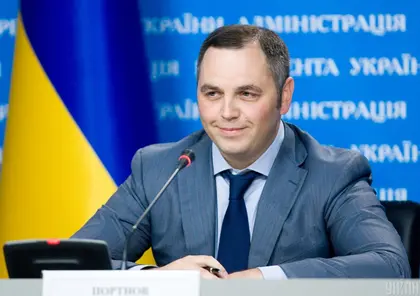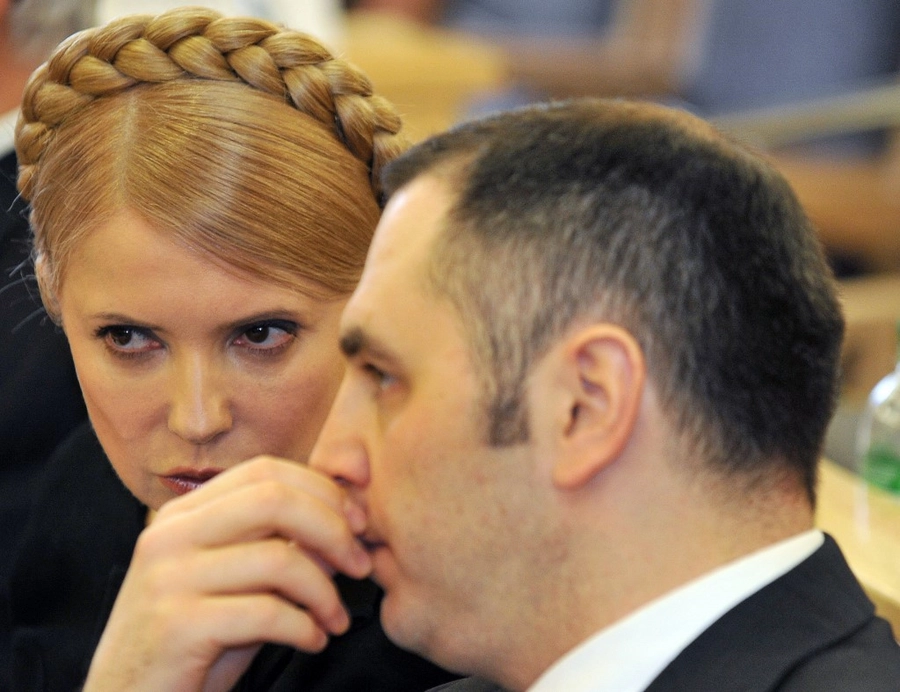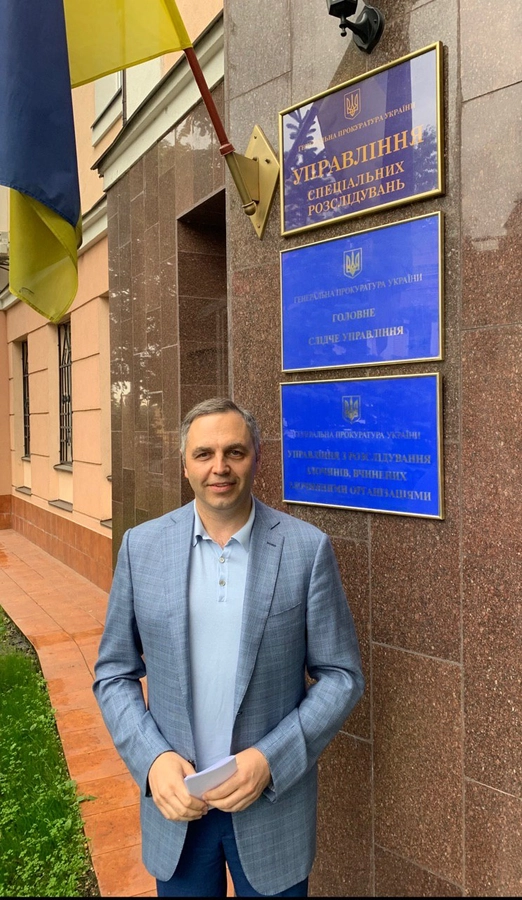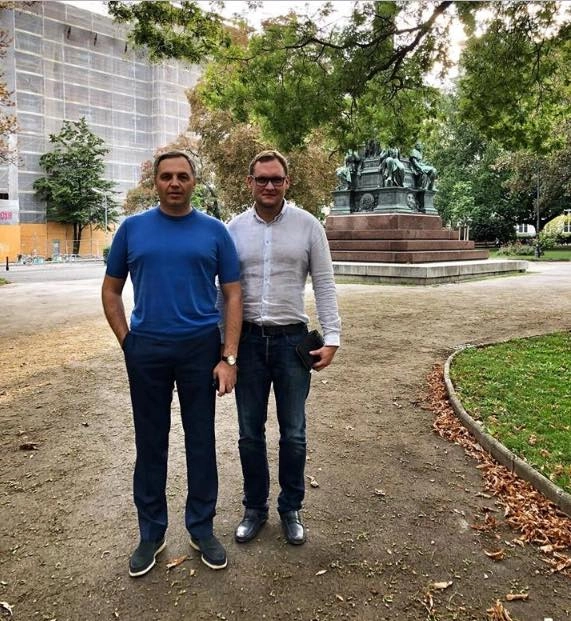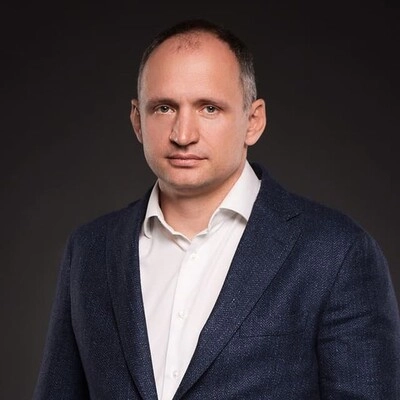The US charge sheet against Andriy Portnov is a lengthy one.
JOIN US ON TELEGRAM
Follow our coverage of the war on the @Kyivpost_official.
When announcing sanctions against him in December of 2021, the US Department of the Treasury accused the Ukrainian lawyer and politician of, among other things:
- cultivating extensive connections to Ukraine’s judicial and law enforcement apparatus through bribery;
- colluding with a high-ranking Ukrainian government official to shape the country’s higher legal institutions to their advantage and influence Ukraine’s Constitutional Court;
- using his influence to buy access and decisions in Ukraine’s courts and undermining reform efforts.
Yet Portnov was unfazed at being sanctioned – indeed, he seemed to view them as a badge of honor that leant a certain mystique to his image.
“Many people look at me with interest since the introduction of sanctions,” he said in an interview in February of last year.
And why would he be worried? In his home country of Ukraine where, according to the US, he had engaged in long-running judicial manipulation and bribery, he currently faces no sanctions whatsoever.
Mykhailo Zhernakov, Head of Board at the DEJURE Foundation, told Kyiv Post: “Portnov should be on the sanctions list because he is an enemy and rusnya [a derogatory term for Russians]. His personal influence still runs through the judicial system through certain people. And because he built it and continues to influence it, the judicial reform we need fails.”
Who is Andriy Portnov?
Portnov began his legal career in the 1990s in his home city of Luhansk, with the help, according to an investigation by Liga.net, of local authorities engaged in criminal activity.
After learning his trade, he then moved to the capital, Kyiv, where he provided legal services for PrivatBank, one of Ukraine’s largest banks co-founded by controversial oligarch Ihor Kolomoisky.

Ukrainian Partisans Report Finding Russian Fuel Depot, Tanks in Crimea
Portnov was also getting acquainted with Kyiv’s political elite and formed a close relationship with Viktor Medvedchuk, then a lawmaker, very rich powerbroker and close friend of Vladimir Putin, once dubbed the “dark prince” of Ukrainian politics.
Portnov had a high opinion of him, saying in 2008: “Viktor is a person I respect. Whether someone likes it or not, Medvedchuk’s role in the development of the state is, without a doubt, very significant.”
In 2021, Medvedchuk was accused of high treason, attempting to steal natural resources from Russian-annexed Crimea, and of handing Ukrainian military secrets to Moscow.
Portnov was also noticed by the second president of Ukraine, Leonid Kuchma, who appointed him to the National Commission for Securities and Stock Markets. In 2004, by presidential decree, he was awarded the title of Honored Lawyer.
His rising profile and reputation attracted further opportunities, and in 2005 he joined the team of Yulia Tymoshenko, the leader of the Yulia Tymoshenko Bloc party and the main competitor of the then-president Viktor Yushchenko.
Then-Prime Minister Yulia Tymoshenko confers with Portnov (R) during a hearing of the Supreme Administrative Court in Kyiv on February 19, 2010. PHOTO: AFP
Portnov headed the legal department at the bloc’s headquarters and in 2006, was elected as a member of Ukraine’s parliament.
Despite working for and alongside Tymoshenko, Portnov over the coming years moved increasingly closer to the man who would become her main rival in the 2010 presidential election and one of Ukraine’s most controversial politicians in the years after – Viktor Yanukovych.
In 2014, Yanukovych would flee to Russia during the Revolution of Dignity in 2014, but in the years preceding his presidential election victory in 2010, he and Portnov gained a reputation for working together to pressure and exert influence on the country’s judges.
After Yanukovych became president, Portnov “betrayed” Tymoshenko and joined the new president’s team, taking charge of judicial reform.
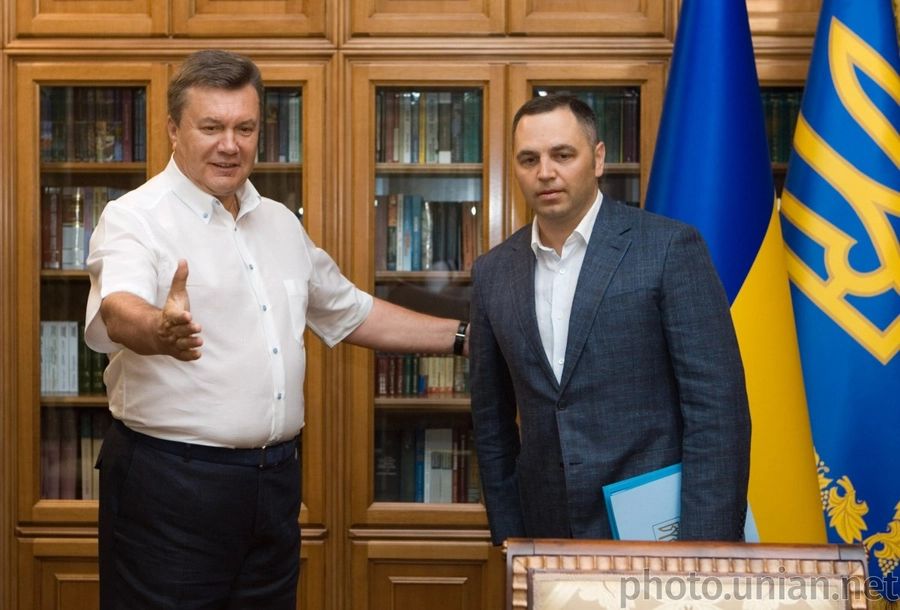 Viktor Yanukovych and Andriy Portnov. Photo by UNIAN.
Viktor Yanukovych and Andriy Portnov. Photo by UNIAN.
Shortly after, the Ukraine’s prosecutor general opened a number of criminal proceedings against Tymoshenko and she would be jailed in 2011.
In a tweet posted in June 2011, Tymoshenko accused Portnov of being part of a conspiracy to engineer her sentence.
Кілька годин тому у Януковича була "сходка",де були Хорошковський, Льовочкін,Портнов та Отрош(голова печерського суду).Узгоджували мій вирок
— Юлія Тимошенко (@YuliaTymoshenko) June 30, 2011
The episode would set the tone for Portnov’s time in charge of judicial reform – a massive overhaul of the entire system was undertaken and, according to reports, “not a single judge of the district court in the city of Kyiv was appointed without a personal interview and consent from Portnov.”
This appointment of judges loyal to Portnov and the president would pay off, and a number of court cases would rule in his favor, including one in 2014 about his alleged involvement in the deaths of activists during the Euromaidan protests.
Fleeing Ukraine
Portnov’s career as well as the public’s attitude toward him took a dramatic turn during the Euromaidan protests, when he was instrumental in the drafting of the notorious “Dictatorship Laws” of Jan. 16, 2014, legislation enacted by then-President Yanukovych in an attempt to quell the protests against his rule. The laws were essentially identical to similar legislation enacted in Russia a little more than a year earlier.
The new laws provoked the generally peaceful protesters to turn violent, and the legislation was largely cancelled within a fortnight. But by that point Yanukovych had lost all credibility, and within a month he tried to crush the protests, leading to more than 100 civilians shot dead by security forces.
Both Yanukovych and Portnov fled to Russia.
In exile
After Russia, Portnov would move to Austria. Despite living abroad, Ukraine’s authorities would launch criminal proceedings against him for illegal enrichment, theft, and even treason for his alleged involvement in Russia’s occupation and annexation of Crimea.
None of the cases went anywhere but Portnov faced accusations from one prosecutor, Serhiy Horbatyuk, who claimed that because most of the judges he installed still held their positions, Portnov was able to continue influencing the courts from afar.
Return to Ukraine
Portnov returned to Ukraine in 2019 around the time Volodymyr Zelensky was elected president and was on friendly terms with the President’s former chief-of-staff, Andriy Bohdan.
Portnov in Ukraine. Photo by Portnov's Telegram channel.
Such was the toxicity of Portnov in the public’s eyes, that President Zelensky himself made a statement claiming he had no official relationship with his team.
And yet, the rumors of Portnov exerting influence over Kyiv’s courts persisted – according to media reports, in 2019 Portnov, together with the former head of the District Administrative Court of Kyiv, Pavel Vovk (under US sanctions since December 2022), exerted pressure on the Council of Judges and influenced the change of leadership of the Constitutional Court (the appointment of Oleksandr Tupytsky, who was suspended in 2022 and has had US sanctions imposed on him).
Vovk called Portnov a “megamind” but denied that he was his partner.
Currently, Zelensky’s team includes two people who are associated with Portnov – Andriy Smirnov and Oleg Tatarov, both deputy heads of the Office of the President, headed by Andriy Yermak, who serves as Zelensky’s chief of staff.
Andriy Smyrnov and Andriy Portnov. Photo: Facebook
Smirnov publicly denied his relationship with the politician several times. He told Kyiv Post that he was familiar with Portnov, had never been on friendly terms, and communicated exclusively in matters of his former legal practice.
“In the last three years, I have not had any communication at all,” he added. “I have said many times and I will say it again that on the path of life sometimes there are people whom I would rather have never met. There is nothing in common [between us], neither in interests, nor in life values, nor in professional activities.”
Tatarov worked as Portnov’s lawyer and has not commented on his relationship in the media.
Russia’s full-scale invasion
Portnov fled Ukraine once again in June 2022, prompting speculation in Ukrainian media about how a male of fighting age (48) was able to leave the country under martial law.
In a comment to Kyiv Post, Portnov explained that a few days before his departure, he had made a request to the border service.
“The reasons for me going abroad are to be able to personally raise my four minor children,” he explained, giving the children’s names and year of birth. Now all live in Turkey.
In addition, he has two older children. His 29-year-old son Ihor was also able to leave Ukraine as a humanitarian volunteer in March of last year, but he never returned.
Back to the sanctions
Oleksiy Danilov, secretary of the National Security and Defense Council (RNBO), has been repeatedly asked when the RNBO will introduce sanctions against Portnov, in line with the ones imposed by the US.
He claimed earlier this month that there is currently no reason for this. “We work only with documents. If nobody has submitted documents (it doesn’t matter whether it’s Portnov or some other surname), we can’t invent and use emotions,” Danilov said.
The Security Service of Ukraine (SBU), the Cabinet of Ministers, and the National Bank are some of the agencies that could submit these documents.
Kyiv Post contacted all the organisations above, but they again recommended asking the RNBO. The National Bank added that they deal with sanctions only as pertains to the financial market.
According to Kyiv Post sources in the Office of the President, Tatarov may hold the key to understanding the lack of sanctions, as the President’s entourage continues communication with Portnov through Tatarov, his former lawyer – especially in matters of law enforcement agencies and the judicial system.
Oleg Tatarov. Photo: Tatarov's Telegram-channel
Tatarov, as deputy head of the Office of the President, is directly responsible for these areas.
Portnov told Kyiv Post he “does not have extra-procedural or illegal contacts with any officials.”
Zhernakov concluded: “The question why Portnov is still not under Ukrainian sanctions should be asked by the responsible deputy heads of the Office of the President, in particular Smyrnov, who has a photo with Portnov. And another deputy Tatarov is his former lawyer.”
You can also highlight the text and press Ctrl + Enter


